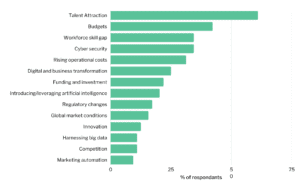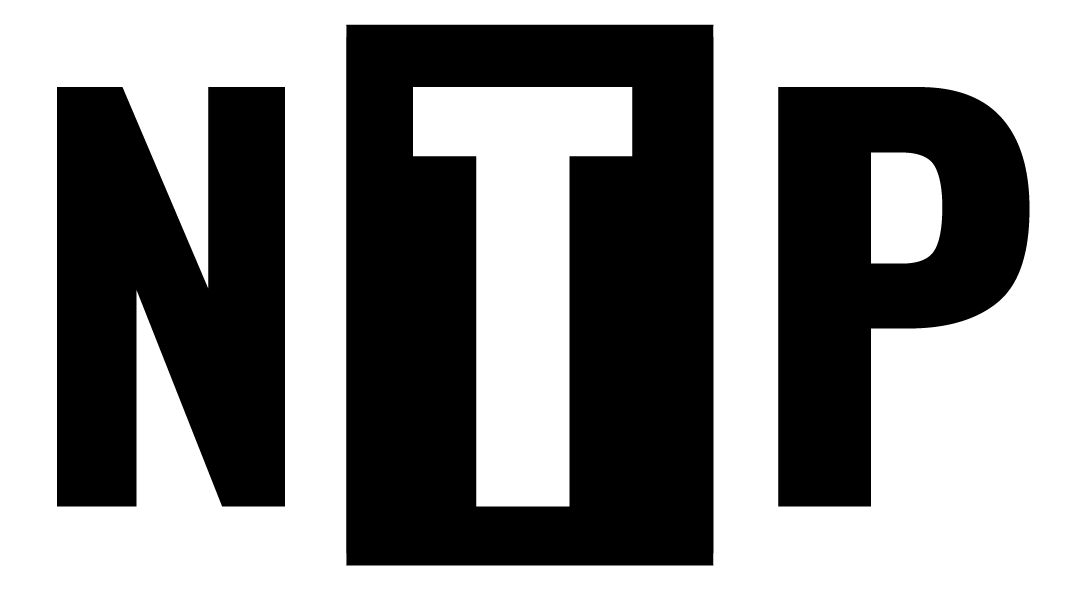Talent attraction, budgets, cyber security, and the workforce skills gap are the primary concerns for technology leaders in the next 12 months. In our 2023 Australian Technology Community Survey, we asked technology professionals responsible for managing teams what they believe their most significant organisational challenges will be in the coming year.

Challenges organisations are facing in the next 12 months.
Talent Attraction Takes the Lead
One of the survey’s most striking findings is that 61% of respondents listed talent attraction as their most significant business challenge for the upcoming year. The technology sector is highly competitive, and finding and retaining top talent has always been a priority. However, this challenge has been amplified; we see it as the number one challenge because of what leaders have experienced during the highly competitive talent market for tech professionals post-COVID-19.
With the rise in remote work, companies investing in technology, and a strong VC market, the competition for talent during 2022 was fierce. Companies were not only competing with each other but also with international organisations for the same pool of talent.
In positive news for technology leaders, there has been a change in the talent market since our survey in early 2023, with job advertisements down across Australia for the ICT market, indicating fewer companies are actively hiring. This should mean leaders looking for technology talent for their teams should find it less competitive than last year and may be able to attract a higher quality talent than in the past twelve months.
In saying this, companies should continue to adopt innovative approaches to recruitment, such as offering attractive compensation packages, flexible work arrangements, and professional development opportunities to stand out in the crowded job market.
Budget Constraints Follow Closely
Budgets emerged as the second most pressing concern, with 42% of respondents expressing concern about financial constraints in the coming year. Managing technology teams often requires significant financial resources, from investing in cutting-edge tools and technologies to providing ongoing employee training and development. However, budget constraints can hinder these efforts and potentially limit an organisation’s ability to achieve its goals.
In response to this challenge, technology leaders must prioritise their spending carefully, focusing on initiatives that promise the highest return on investment. This may involve reevaluating existing projects, renegotiating vendor contracts, and exploring moving resource allocations between teams and projects.
The Cybersecurity Conundrum
Cybersecurity was another major concern, with 34% of respondents identifying it as a significant challenge. In today’s digital landscape, cybersecurity is paramount, and organisations must remain vigilant to protect their sensitive data and operations from cyber threats. The evolving nature of cyberattacks and the increasing sophistication of cybercriminals make this an ongoing challenge for technology teams.
To address cybersecurity concerns, businesses should continue to invest in robust security measures, conduct regular risk assessments, and provide comprehensive training to their employees. Collaborative efforts across the industry and partnerships with cybersecurity experts can also help organisations stay ahead of emerging threats.
The Workforce Skills Gap
Sharing the third spot with cybersecurity, 34% of survey respondents identified the workforce skills gap as a challenge. Rapid technological advancements and changes in the business landscape demand a workforce with evolving skill sets. However, many organisations struggle to find employees with the right skills and experience to meet these demands. Some potential solutions to consider include:
Contractors and contingent workforces
Companies can look at short-term and long-term solutions to bridge the workforce skills gap. From a short-term perspective, we’ve seen many companies succeed by bringing in either contractors, freelancers or digital agencies to fulfil a particular skill set.
Hiring contractors can be instrumental and cost-effective if the skillset is required to deliver a critical project or help uplift skills within a team. Contingent workforces don’t bind a company into a long-term inflexible agreement, and reduces the added payroll costs of annual and other leave. Additional benefits include having the flexibility to be agile and adapt to changing economic and business challenges, furthermore it can introduce fresh perspectives to a team or business problem.
Skills-based hiring
The competition for talent is still challenging, so adopting a “skills-based hiring” approach is emerging as a solid alternative to traditional recruitment methods.
Globally, the rising skills gap will see industries such as Technology, Media and Telecommunications fall short of 4.3 million workers by 2030. In Australia, this shortage could equate to $15.7 billion in unrealised revenue for companies.
Skills-based hiring considers soft skills and hard skills to “screen in” candidates, rather than eliminating applicants that don’t look to have the right educational background. Degrees alone won’t tell you if an applicant has the ability to perform. A skills-based approach uses screening techniques and skills-based assessments to screen and hire new employees based on the capability, talent and skills they bring to the table, as opposed to their educational background or degree.
Additionally, building partnerships with educational institutions and offering internships and apprenticeships can help develop a pipeline of future talent with the necessary skills.
Need advice on hiring for skills? Reach out to Linda Apostoldis on 0420 845 795 or [email protected] to discuss contracting options or strategies you can implement for skills-based hiring methods.
